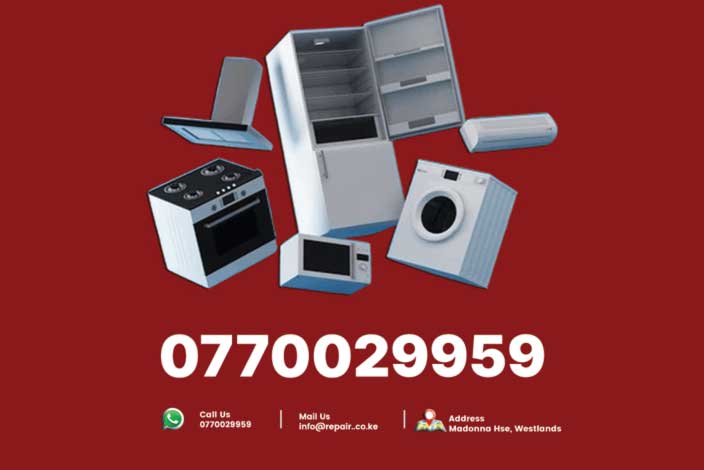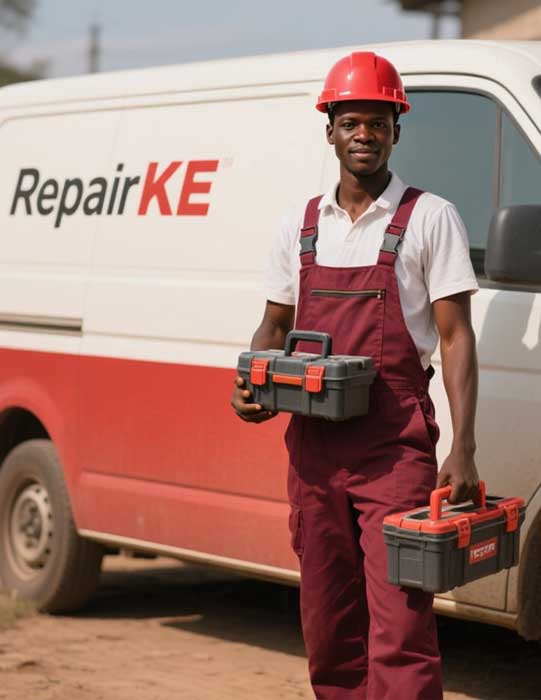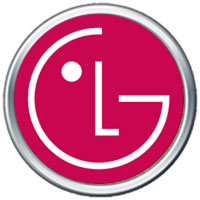Same Day Washing Machine Repair in Nairobi, Reliable Service
Is your washing machine giving you trouble? Don't let a faulty appliance disrupt your daily routine. RepairKE offers professional Same Day Washing Machine Repair in Nairobi with experienced technicians ready to solve all your washing machine problems. We understand how important a working washing machine is to your household, which is why we provide fast, reliable, and affordable repair services across Nairobi.
Our team of certified technicians has years of experience handling all washing machine brands and models. Whether you own a top loader, front loader, semi-automatic, or fully automatic washing machine, we have the expertise to get it running smoothly again. With our Same Day Washing Machine Repair in Nairobi service, you can have your appliance fixed quickly without the long wait times common with other repair companies.
1. Washing Machine Error Troubleshooting Service in Nairobi
Modern washing machines come with error codes that help identify problems quickly. However, understanding these codes can be confusing for most homeowners. Our Same Day Washing Machine Repair in Nairobi includes comprehensive error troubleshooting services to identify and fix issues promptly.
Our technicians are trained to diagnose error codes from all major brands including Samsung, LG, Whirlpool, Bosch, Hotpoint, and many others. We use advanced diagnostic tools to pinpoint the exact problem causing the error code to appear on your machine's display.
Common Error Codes We Handle
| Error Code | Problem Description | Troubleshooting Cost (Ksh) |
|---|---|---|
| E1/1E | Water Supply Error | 500 - 1,000 |
| E2/2E | Drainage Problem | 500 - 1,200 |
| E3/3E | Motor Overload | 800 - 1,500 |
| E4/4E | Water Temperature Error | 600 - 1,300 |
| E5/5E | Water Heating Problem | 700 - 1,400 |
| UE/UB | Unbalanced Load | 400 - 800 |
| LE/LE1 | Motor Lock Error | 1,000 - 2,000 |
| OE | Drainage Obstruction | 600 - 1,200 |
"Did you know? Over 60% of washing machine error codes are related to water inlet or drainage issues, which can often be resolved within an hour by a professional technician."
Ready to fix that annoying error code? Call us now at 0770029959 for immediate assistance!
2. Washing Machine Diagnosis Service in Nairobi
Not all washing machine problems show error codes. Sometimes your machine may simply not work properly without displaying any warning. Our Same Day Washing Machine Repair in Nairobi includes thorough diagnostic services to identify hidden problems that affect your machine's performance.
Our diagnosis process is systematic and detailed. We check all components including the motor, drum, belts, pumps, valves, control board, and electrical connections. This comprehensive approach ensures we find the root cause of the problem, not just the symptoms.
Diagnostic Service Pricing
| Diagnostic Service | Description | Cost (Ksh) |
|---|---|---|
| Basic Diagnosis | Visual inspection and simple tests | 500 - 800 |
| Standard Diagnosis | Component testing with basic tools | 1,000 - 1,500 |
| Advanced Diagnosis | Electronic testing with specialized equipment | 1,500 - 2,500 |
| Complete System Analysis | Full machine inspection and testing | 2,000 - 3,000 |
| Home Visit Diagnosis | On-site assessment fee | 500 - 1,000 |
What Our Diagnosis Covers
- Motor performance testing
- Drum and bearing inspection
- Water inlet valve examination
- Drainage pump functionality
- Control board assessment
- Electrical wiring check
- Timer and switch testing
- Door lock mechanism review
"Professional diagnosis saves you money in the long run by identifying the exact problem, preventing unnecessary part replacements and ensuring the right fix the first time."
Don't guess what's wrong with your washing machine. Contact RepairKE at 0770029959 for accurate diagnosis today!
3. Washing Machine Repair Service in Nairobi
Once we have identified the problem, our skilled technicians proceed with efficient repairs using quality parts and proper techniques. Our Same Day Washing Machine Repair in Nairobi ensures your laundry schedule is not disrupted for long. We handle all types of repairs from simple fixes to complex component replacements.
Our repair service is backed by a warranty that gives you peace of mind. We stand behind our work because we use genuine parts and follow manufacturer guidelines for all repairs.
Repair Service Costs
| Repair Type | Problem Fixed | Cost Range (Ksh) |
|---|---|---|
| Motor Repair | Motor replacement or repair | 3,000 - 8,000 |
| Drum Repair | Drum bearing or shaft issues | 4,000 - 10,000 |
| Pump Replacement | Water drainage pump | 2,500 - 5,000 |
| Control Board Repair | Electronic control issues | 3,500 - 12,000 |
| Door Lock Repair | Door latch mechanism | 1,500 - 3,500 |
| Belt Replacement | Drive belt issues | 1,000 - 2,500 |
| Valve Replacement | Water inlet valve | 1,500 - 3,000 |
| Timer Repair | Program timer problems | 2,000 - 5,000 |
| Seal Replacement | Door gasket or seal | 2,000 - 4,500 |
| Suspension Repair | Drum suspension system | 3,000 - 7,000 |
Why Choose Our Repair Service
- Quick Response Time: Our Same Day Washing Machine Repair in Nairobi means we respond within hours, not days
- Experienced Technicians: All our staff are trained and certified
- Quality Parts: We use original or high-quality replacement parts
- Warranty Coverage: All repairs come with a service warranty
- Transparent Pricing: No hidden charges or surprise fees
"Regular repairs by qualified technicians can extend your washing machine's lifespan by 5-10 years, making professional repair more cost-effective than purchasing a new machine."
Need urgent washing machine repair? We're just a phone call away! Dial 0770029959 or visit us at Waiyaki Way, Nairobi.
4. Washing Machine Maintenance Service in Nairobi
Prevention is better than cure. Regular maintenance keeps your washing machine running efficiently and prevents costly breakdowns. Our Same Day Washing Machine Repair in Nairobi also includes preventive maintenance services designed to catch problems before they become serious.
Many homeowners neglect washing machine maintenance until something breaks down. However, regular servicing can prevent most common problems and improve your machine's energy efficiency.
Maintenance Service Packages
| Service Package | What's Included | Cost (Ksh) |
|---|---|---|
| Basic Cleaning | Drum cleaning, filter cleaning, exterior wiping | 1,000 - 1,500 |
| Standard Service | Cleaning plus belt check, hose inspection | 1,500 - 2,500 |
| Premium Service | Full cleaning, all components check, lubrication | 2,500 - 4,000 |
| Annual Contract | Quarterly maintenance visits (4 per year) | 8,000 - 12,000 |
| Deep Clean Service | Descaling, mold removal, sanitization | 2,000 - 3,500 |
Maintenance Service Benefits
- Extends machine lifespan
- Reduces energy consumption
- Prevents bad odors
- Improves washing performance
- Reduces repair costs
- Maintains warranty validity
- Ensures hygienic operation
What We Do During Maintenance
- Clean the drum and detergent dispenser
- Check and clean the lint filter
- Inspect hoses for wear or leaks
- Test the door seal condition
- Verify proper drainage
- Check electrical connections
- Test all cycle programs
- Lubricate moving parts
- Check for unusual noises
- Provide maintenance report and recommendations
"Experts recommend professional washing machine maintenance every 6 months to ensure optimal performance and prevent unexpected breakdowns, especially in areas with hard water like parts of Nairobi."
Protect your investment! Schedule regular maintenance with RepairKE. Call 0770029959 or visit repair.co.ke today!
5. Washing Machine Parts Repair and Replacement Service in Nairobi
Sometimes washing machine components need replacement rather than repair. Our Same Day Washing Machine Repair in Nairobi includes a comprehensive parts replacement service with access to genuine spare parts for all major brands.
We maintain relationships with authorized suppliers to ensure we can source the right parts quickly. This means less waiting time for you and faster completion of repairs.
Common Parts and Replacement Costs
| Part Name | Function | Replacement Cost (Ksh) |
|---|---|---|
| Motor | Powers the drum rotation | 5,000 - 12,000 |
| Pump | Drains water from the machine | 2,000 - 4,500 |
| Belt | Transfers motor power to drum | 800 - 2,000 |
| Control Board | Electronic control center | 4,000 - 15,000 |
| Door Lock | Secures door during operation | 1,500 - 3,000 |
| Inlet Valve | Controls water flow into machine | 1,200 - 2,500 |
| Pressure Switch | Monitors water level | 1,000 - 2,200 |
| Thermostat | Controls water temperature | 1,500 - 3,500 |
| Drum Bearings | Supports drum rotation | 3,000 - 8,000 |
| Shock Absorbers | Reduces vibration | 2,500 - 5,000 |
| Door Seal | Prevents water leakage | 2,000 - 4,000 |
| Heating Element | Heats water for washing | 2,500 - 5,500 |
Parts Quality Guarantee
We source parts from three categories based on your budget and preference:
- Original Parts: Direct from manufacturer, highest quality
- OEM Parts: Original Equipment Manufacturer approved alternatives
- Quality Aftermarket: Tested third-party parts with warranty
Parts Replacement Process
Our systematic approach ensures quality results:
- Accurate diagnosis to identify the faulty part
- Sourcing the correct part for your specific model
- Professional installation following manufacturer guidelines
- Testing the machine after replacement
- Providing warranty documentation
- Disposal of old parts responsibly
"Using genuine or quality parts during replacement can make a significant difference in repair longevity. Low-quality parts may save money initially but often fail within months, requiring repeated repairs."
Need washing machine parts replaced? Get quality parts and expert installation from RepairKE. Contact us at 0770029959 today!
Why Choose RepairKE for Your Washing Machine Repair Needs
When you choose RepairKE, you're choosing reliability and professionalism. Our commitment to providing Same Day Washing Machine Repair in Nairobi sets us apart from competitors who make you wait days or weeks for service.
Our Service Advantages
- Fast Response: We understand emergencies and respond quickly
- Experienced Team: Years of experience with all brands
- Affordable Rates: Competitive pricing without compromising quality
- Service Warranty: We guarantee our work
- Customer Support: Friendly and helpful customer service
- Convenient Location: Easy to reach at Waiyaki Way, Nairobi
- Flexible Scheduling: We work around your schedule
Service Coverage
We provide washing machine repair services throughout Nairobi including Westlands, Parklands, Kilimani, Lavington, Karen, Kileleshwa, Runda, Kitisuru, Spring Valley, Muthaiga, Riverside, and surrounding areas.
Contact RepairKE Today
Don't let a broken washing machine pile up your laundry. Contact RepairKE for professional, fast, and affordable washing machine repair services.
Phone: 0770029959
Address: Waiyaki Way, Nairobi Kenya
Website: repair.co.ke
Experience the best Same Day Washing Machine Repair in Nairobi by calling us today. Our friendly customer service team is ready to schedule your service appointment and answer any questions you may have about our services.
Remember, the longer you wait to repair your washing machine, the more damage can occur and the more expensive the repair becomes. Act now and let our expert technicians restore your washing machine to perfect working condition!
This article provides general information about washing machine repair services. Actual costs may vary depending on specific machine models, problem severity, and parts availability. Contact RepairKE for accurate quotations based on your specific situation.






